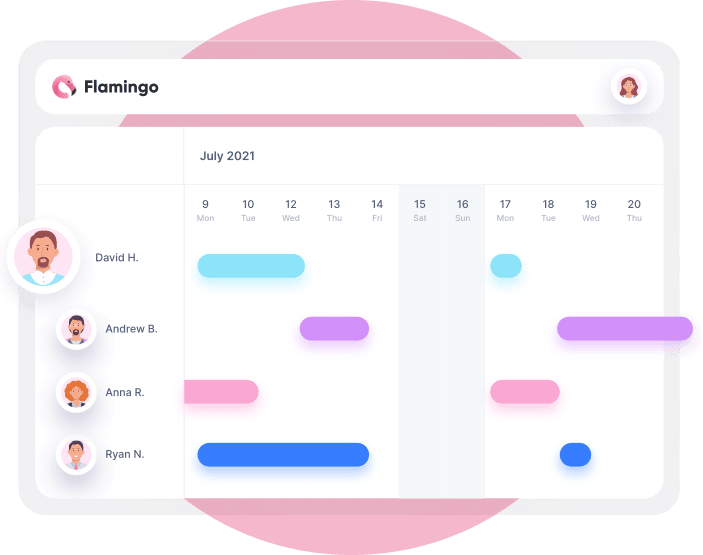
Flamingo is a leave management solution built for modern teams.
No more cluttered spreadsheets and manual data entry. Manage your entire team's leave, directly from Slack, and speed up your leave management workflow.
Learn more Sign Up FreeThis post will guide you through employee leave laws for businesses and workers located in the state of Rhode Island.
Follow this guide to understand employers’ obligations for vacation time, paid time off (PTO), sick leave, parental leave, bereavement and more, along with state holidays observed in Rhode Island.
This page is intended for reference purposes only and does not constitute legal advice. Please see official government sources or consult a legal professional for actual legal advice.
There are no federal or state laws requiring Rhode Island employers to provide vacation time – paid or unpaid.
Rhode Island law does not address Use It or Lose It, suggesting employers are free to implement such a policy in their business.
It’s recommended, however, to have a clear written policy that employees are aware of, stating any rules regarding paid time off (such as Use It or Lose It).
Use It or Lose It leave policies mean that any leave not used at the end of the year is forfeited, and not carried over to the following year. Learn more about Use It or Lose It policies here.
If an employee has worked for the company for at least one year, their employer must pay out any unused vacation pay when the employee leaves the job. This payment is required within 24 hours of separation.
Read More: PTO Payout Laws by State
Employers with 18 or more employees in Rhode Island must provide at least one hour of paid sick leave (referred to in Rhode Island state law as Sick and Safe Leave) for every 35 hours worked, up to a maximum of 40 hours per year.
Businesses are allowed to put a waiting period of 90 days in place, where sick leave still accrues, however the employee cannot use their leave until after the 90 days are up.
Any unused paid sick and safe leave will carry over at the end of the year, but unused sick leave is not required to be paid out upon separation of employment.
Besides any state laws or provisions written into employment contracts, employers in Rhode Island must comply with the Family and Medical Leave Act (FMLA), which entitles eligible employees the right to take 12 weeks of unpaid, job-protected leave for serious health conditions, or to care for spouses, children or parents with a serious health condition.
The following official state holidays are observed in Rhode Island:
| Date | Holiday |
|---|---|
| January 1 | New Year’s Day |
| Last Monday in May | Memorial Day |
| July 4 | Independence Day |
| 2nd Monday in August | Victory Day |
| 1st Monday in September | Labor Day |
| 2nd Monday in October | Columbus Day |
| November 11 | Veterans Day |
| 4th Thursday in November | Thanksgiving Day |
| December 25 | Christmas Day |
There is no requirement to allow employees a paid or unpaid day off for state holidays, and employees required to work on state holidays are not legally entitled to extra compensation (such as higher pay or a compensatory day off), unless promised in their employment contract.
Rhode Island has its own version of the FMLA, called the Rhode Island Parental & Family Medical Leave Act (RIPFML).
Under the RIPFML, employees working in a company with 50 or more employees are entitled to 13 consecutive weeks of unpaid, job-protected leave in any two calendar years for the birth of their child, placement of an adopted child under the age of 16, or for a serious illness of the employee or an immediate family member.
Fathers are entitled to the same RIPFML benefits for the birth of their child, or a new adoption.
There is no legal requirement to provide bereavement leave in Rhode Island, paid or unpaid.
Rhode Island employers do not have to provide paid leave for jury duty.
Rhode Island employers do not have to provide paid voting leave.
Workers who have been employed for over 12 consecutive months are entitled to 10 hours of unpaid leave in a 12 month period to attend school-related activities or school conferences for their child or dependent.
Federal Law (the Uniformed Services Employment and Reemployment Rights Act (USERRA)) applies in Rhode Island, which states that military service members receive up to five years of unpaid leave for military service, and upon returning, must be reinstated to the same position (or an equivalent position) as they had before their leave.
Rhode Island Family Military Leave gives employees working in a company with 15 or more employees the right to unpaid leave if their spouse or child is called up to military service.
In companies with 15-50 employees, the employee is entitled to up to 15 days of unpaid leave. In companies with over 50 employees, the employee is entitled to up to 30 days of unpaid leave.
Anything not covered in Rhode Island state leave laws is up to the discretion of the employer, such as whether or not to provide paid sick leave or PTO, or whether PTO rolls over from year to year.
However, if any benefits are laid out in an employee’s contract or company policy, employers must comply with what has been agreed in that document.
For example, if an employee’s contract states that they are to receive 12 days of PTO each year, the employer is legally required to provide this, even though paid time off is not required by state law.
https://dlt.ri.gov/regulation-and-safety/labor-standards/paid-sick-and-safe-leave
https://dlt.ri.gov/sites/g/files/xkgbur571/files/documents/requiredposters/familyleave.pdf

No more cluttered spreadsheets and manual data entry. Manage your entire team's leave, directly from Slack, and speed up your leave management workflow.
Learn more Sign Up Free